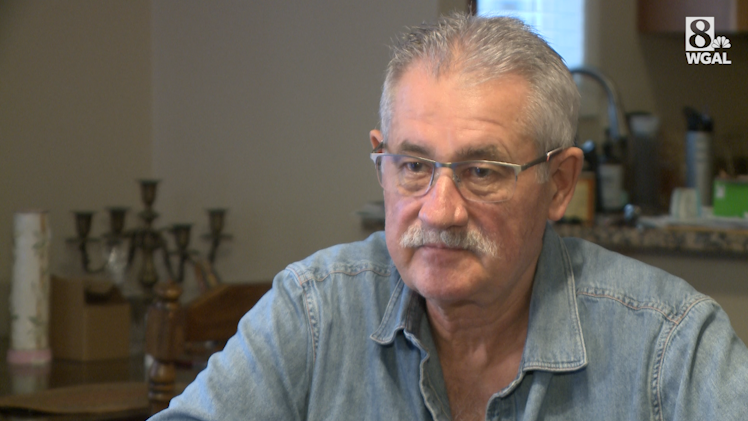The romance scam cost people more than $1.1 billion last year, according to the federal government.One of the victims is a Lancaster County man who lost thousands.Mark Heath said an attractive young woman who identified herself on Facebook as “Libby Collins” connected with him through the site and quickly started sweet-talking him.”Well, it came about immediately. You know, she starts, ‘Oh my God, you’re a great guy and we love you.’ All this stuff, you know? And she sucked me into it, and here I’m a lonely guy,” he said.Heath lives alone, as his family is in another part of the country. In short order, Libby Collins convinced him to take advantage of an investment opportunity involving cryptocurrency.”She talked me into sending her money, and I did. And I was on this medication for Parkinson’s disease,” he said.He said the medication severely altered his judgment, and he no longer takes it. “I sent three wire transfers to this company, and the bank warned me. Wells Fargo people warned me. They said, ‘Mark, we’re warning you. This is probably a scam. You shouldn’t do it.’ You know that my brain wasn’t working right at that point. I said, ‘I’m going to do that anyway,'” Heath said.’I’m mad more than I am hurt’This is a particular kind of romance scam with a rather gruesome name — it’s called pig butchering.Victims are persuaded to invest money. Once the money is sent, the scammer vanishes.The term pig butchering comes from the idea of “fattening” up the victim with love, praise and attention before stealing their money.”Everything I had — $165,000. Everything I have. I got nothing left. Nothing left,” Heath said.Heath isn’t sitting around feeling sorry for himself. He’s working with the FBI, Secret Service and U.S. Attorney’s Office in Texas – where he sent some of his money. “I’m mad. I’m angry. I’m mad more than I am hurt. Hurt? You know, hell, she’s a crazy woman. I guess she was a scammer. I mean, she’s very slick, very good at it,” he said. Many of these scams have been traced back to southeast Asia and China.The most recent statistics from the FBI indicate this scam increased by 183% last year.Scammers are still targeting Heath, who has received dozens more pictures of young women.”I want to prevent other people from going through the same thing that I went through. I want to prevent and I want to see this woman in jail. I want to see this thing broken,” he said.Heath sent his money to three different places.Investigators have traced at least half of that – $80,000 – but it’s been turned into cryptocurrency. Whether or not he gets it back remains to be seen.The romance scam takes advantage of people in very vulnerable situations – usually widows or widowers.If you know someone on their own, keep an eye on who they are communicating with online.Protect yourselfThe FBI offered these tips for avoiding romance scams:Be careful what you post and make public online. Scammers can use details shared on social media and dating sites to better understand and target you.Research the person’s photo and profile using online searches to see if the image, name or details have been used elsewhere.Go slowly and ask lots of questions.Beware if the individual seems too perfect or quickly asks you to leave a dating service or social media site to communicate directly.Beware if the individual attempts to isolate you from friends and family or requests inappropriate photos or financial information that could later be used to extort you.Beware if the individual promises to meet in person but then always comes up with an excuse why he or she can’t. If you haven’t met the person after a few months, for whatever reason, you have good reason to be suspicious.Never send money to anyone you have only communicated with online or by phone.
The romance scam cost people more than $1.1 billion last year, according to the federal government.
One of the victims is a Lancaster County man who lost thousands.
Mark Heath said an attractive young woman who identified herself on Facebook as “Libby Collins” connected with him through the site and quickly started sweet-talking him.
“Well, it came about immediately. You know, she starts, ‘Oh my God, you’re a great guy and we love you.’ All this stuff, you know? And she sucked me into it, and here I’m a lonely guy,” he said.
Heath lives alone, as his family is in another part of the country.
In short order, Libby Collins convinced him to take advantage of an investment opportunity involving cryptocurrency.
“She talked me into sending her money, and I did. And I was on this medication for Parkinson’s disease,” he said.
He said the medication severely altered his judgment, and he no longer takes it.
“I sent three wire transfers to this company, and the bank warned me. Wells Fargo people warned me. They said, ‘Mark, we’re warning you. This is probably a scam. You shouldn’t do it.’ You know that my brain wasn’t working right at that point. I said, ‘I’m going to do that anyway,'” Heath said.
‘I’m mad more than I am hurt’
This is a particular kind of romance scam with a rather gruesome name — it’s called pig butchering.
Victims are persuaded to invest money. Once the money is sent, the scammer vanishes.
The term pig butchering comes from the idea of “fattening” up the victim with love, praise and attention before stealing their money.
“Everything I had — $165,000. Everything I have. I got nothing left. Nothing left,” Heath said.
Heath isn’t sitting around feeling sorry for himself. He’s working with the FBI, Secret Service and U.S. Attorney’s Office in Texas – where he sent some of his money.
“I’m mad. I’m angry. I’m mad more than I am hurt. Hurt? You know, hell, she’s a crazy woman. I guess she was a scammer. I mean, she’s very slick, very good at it,” he said.
Many of these scams have been traced back to southeast Asia and China.
The most recent statistics from the FBI indicate this scam increased by 183% last year.
Scammers are still targeting Heath, who has received dozens more pictures of young women.
“I want to prevent other people from going through the same thing that I went through. I want to prevent and I want to see this woman in jail. I want to see this thing broken,” he said.
Heath sent his money to three different places.
Investigators have traced at least half of that – $80,000 – but it’s been turned into cryptocurrency. Whether or not he gets it back remains to be seen.
The romance scam takes advantage of people in very vulnerable situations – usually widows or widowers.
If you know someone on their own, keep an eye on who they are communicating with online.
Protect yourself
The FBI offered these tips for avoiding romance scams:
- Be careful what you post and make public online. Scammers can use details shared on social media and dating sites to better understand and target you.
- Research the person’s photo and profile using online searches to see if the image, name or details have been used elsewhere.
- Go slowly and ask lots of questions.
- Beware if the individual seems too perfect or quickly asks you to leave a dating service or social media site to communicate directly.
- Beware if the individual attempts to isolate you from friends and family or requests inappropriate photos or financial information that could later be used to extort you.
- Beware if the individual promises to meet in person but then always comes up with an excuse why he or she can’t. If you haven’t met the person after a few months, for whatever reason, you have good reason to be suspicious.
- Never send money to anyone you have only communicated with online or by phone.
Click Here For The Original Source.

